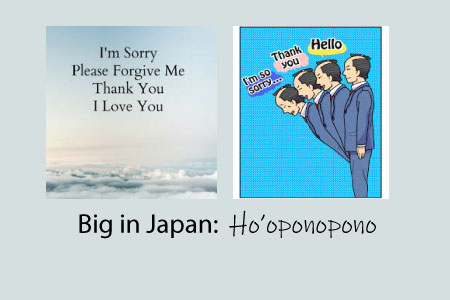
- Written:
- Author: Edward
- Posted in: culture wars, dr ed park, News, politics, slice of life, travel
- Tags: Dr. Ed Park, ethnography, ho'oponopono, japan, manners, shared divinity
I have been fortunate to travel in Japan this week with my son. I was just remarking to a hotel staff member that Japanese culture is quite unique in my opinion. In no other place in the world are you safe from being swindled by taxi drivers and merchants, ordinary citizens feel a moral obligation to help you find your way around, and do people use the four Ho’oponopono phrases as much.
In Hawaiian culture, the phrases of Ho’oponopono are meant to correct or restore lokahi or harmony to a relationship. In Japan, nearly all communications consist of “I’m sorry” and the implicit “please forgive me” (sumimasen and gomenasai), “thank you” (arigato), and I love you”. When you remove the data interchange function of language, it feels as though the entire country is constantly apologizing, asking for forgiveness, giving thanks, and saying “I appreciate you” (which is a kind of love expressed as ostukaresama or “you are working hard”)
I would argue that the practice of these four phrases will serve you well in any country, despite the language deficiencies you may have.
- “I’m sorry” immediately humbles yourself and admits a deficiency you bring to the relationship.
- “Please forgive me” acknowledges the power the other person has and their voluntary agency in the relationship.
- “Thank you” expresses gratitude for hopefully choosing to be kind.
- “I love you (I appreciate your work)” acknowledges the virtuous struggles that the other is engaged in.
In a larger sense, the four phrases are the currency of spiritual relatedness; we acknowledge the importance, agency, shared humanity and therefore the divinity in the others that we meet during our travels.
I was chatting with a British man of Indian decent on the bullet train and the observation that we both shared was that no other country has such a culture of politeness that will be found in every person you meet. Before leaving the US, I was talking with two other friends who, like me, sometimes feel uncomfortable in Japan owing to our love of humor, irony, and spontaneity. Having said that, the politeness of the Japanese culture is sincere and takes effort.
In every other country you travel to, you notice a millisecond of resentment when you speak English and broken phrases in their language. I believe it consists of thoughts like “oh no, another tourist…this is going to be frustrating…why can’t I remember more of the English I studied?…etc”. In Japan, when the language mismatch starts grinding, you can actually detect most of the latter on their faces; you actually feel bad that they are ashamed they can’t speak English better.
The Japanese people are inculcated with an honor-bound compulsion to get along, be helpful, not be prideful, and to do their best. It is a very human and highly advanced civilization in my estimation but as a free-wheeling American, I still maintain the quintessential phrase of the “ugly American”… a nice place to visit but I wouldn’t want to live there. Americans are free to be rude, thoughtless, and selfish and so when demonstrations of contrition, gratitude, and appreciation occur, they just seem to stand out more. These days, my American friends on Facebook are freewheeling the hell out of everything, unfriending each other for not supporting the Democratic candidate of their choosing; it is rude, shortsighted, and immature. Nevertheless, it presents a rather fascinating and amusing contrast to how a culture of extreme thoughtfulness like Japan compares with our own.

